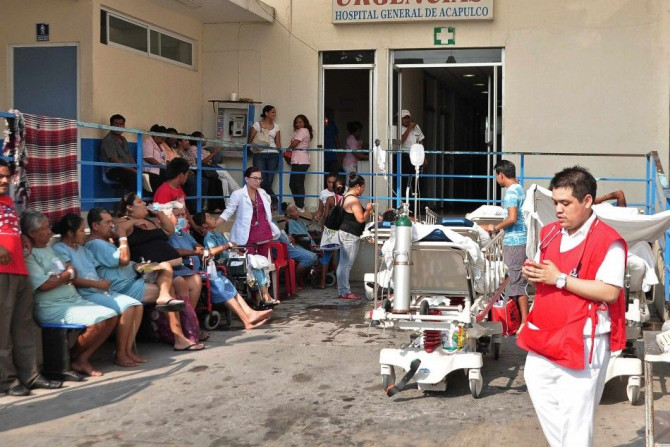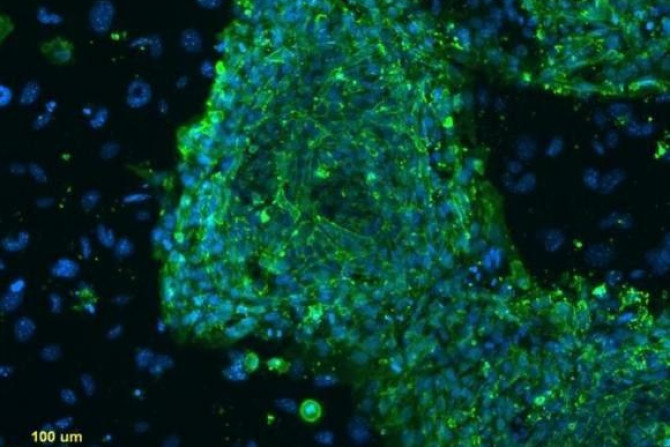Hugh Jackman revealed having his second basal-cell carcinoma (skin cancer) removal on the “X-Men: Days of Future Past” world premiere on May 10 in New York after showing in the premiere with a bandage over his nose.
Jenille Cristy Maido May 12, 2014
Monoamniotic twins or often referred to as "Mono Mono" are identical twins who share both a placenta and an amniotic sac, but have separate umbilical cords.
Silvana Peters May 12, 2014
Saudi Arabia has recently registered three new cases and three new deaths from the potentially fatal Middle East Respiratory Syndrome coronavirus (MERS-CoV) infection.
Esther Tanquintic-Misa May 12, 2014
Transport operators of planes, trains and passenger ships in Canada have been ordered to guarantee the safety of the clean water they offer to their passengers by making sure they adhere to the latest industry or scientific standards.
May 12, 2014
In what could be a historical milestone related to the Fukushima nuclear power plant meltdown in March 2011, plant operator Tokyo Electric Power Co (TEPCO) has been slapped with a lawsuit by no other than a worker who used to work in the crippled facility.
Esther Tanquintic-Misa May 09, 2014
Not only will climate change affect the temperaments of weather patterns, it elevates sea levels and hampers crop production, the rising levels of carbon dioxide are also bound to affect the nutritional value and content of basic foods.
Esther Tanquintic-Misa May 09, 2014
Rising cases of the Midlle East respiratiory syndrome (MERS) have recently been recoded throughout the Arabian Peninsula.
Daniel Joseph Cruz May 09, 2014
A powerful earthquake that measured 6.4 magnitude hit Mexico on Thursday. It was so strong that it sent office workers scrambling outside of their buildings and destroyed a bridge in the south.
May 09, 2014
Shailene Woodley, star of "Divergent" and John Green's "The Fault In Our Stars," guest-starred on "The Late Show" with David Letterman and told the host about her clay diet and the benefits of eating clay.
Tanya Diente May 09, 2014
The radiation from the crippled Fukushima nuclear power plant that has erupted into the atmosphere and fell into the ocean waters will not trigger any increase in cancer or health problems, a report released by the UN Scientific Committee on the Effects of Atomic Radiation said. What will definitely most kill the people are their overreactions and stress over possible radiation afflictions.
Esther Tanquintic-Misa May 08, 2014
Canada has opened its first ever cannabis marijuana vending machine in Vancouver.
Esther Tanquintic-Misa May 08, 2014
Men's favorite hang-out alcoholic beverage (and probably women too) gets all the blame for the burgeoning bellies resulted from drinking too much of it. While it holds true that beer is a major contributor to drinkers' growing waistlines, it's not hard to imagine other factors add up to the equation as well.
Daniel Joseph Cruz May 08, 2014
Recently, "WATERisLife" foundation, and researchers from Carnegie Mellon at the University of Virginia invented the first ever water filtration system that comes in the form of a book, called the "Drinkable Book." The "Book" aims to solve the problem of contaminated drinking water that causes diseases in impoverished areas around the globe.
Daniel Joseph Cruz May 08, 2014
Coca-Cola has recently confirmed the removal of the harmful chemical, brominated vegeteble oil (BVO), in its "Powerade" sports drinks brand.
Daniel Joseph Cruz May 07, 2014
The Government of Saudi Arabia has further intensified its monitoring efforts against cases of the dreaded Middle East respiratory syndrome coronavirus (MERS-CoV).
Esther Tanquintic-Misa May 07, 2014
Drinking beer is one of the best social gatherings of many people worldwide.
Daniel Joseph Cruz May 06, 2014
The search for an everlasting youthfulness may be found in the mice's blood and not from humans yet.
Daniel Joseph Cruz May 06, 2014
A brutal attack has reportedly turned a man into a math genius. He now sees the world through geometry.
Sachin Trivedi May 06, 2014
Ben Pierce, a nine-year old Texas boy from Toronto, Canada, creates a bucket list of "things to see" before he goes blind.
Tanya Diente May 06, 2014
Unresolved military conflicts in Pakistan which unfortunately disrupted polio vaccination campaigns have pushed the virus to spread, forcing the World Health Organisation (WHO) to declare polio a global health emergency.
Esther Tanquintic-Misa May 06, 2014
Mila Kunis has taken her Baby Bump fashion to a new level. Ashton Kutcher's fiancé was spotted exposing her baby bump in a crop top and a long skirt. Kunis, 30, was glowing as she stepped out in L.A. on Sunday.
Sonalee singh May 05, 2014
Omega-3 fatty acid supplements were found to have no benefits on a child's brain development. A major Australian study has found that pregnant mothers who take pre-natal supplements rich in the omega-3 may be wasting their time.
Reissa Su May 05, 2014
The first case of the Middle East Respiratory Syndrome virus was announced by the Centers for Disease Control and Prevention found in a man traveling from Riyadh, Saudi Arabia to Chicago via London.
Sachin Trivedi May 05, 2014
An Australian cardiologist has regrown the world's first monkey heart out of stem cells. The scientist may be on the verge of unlocking a possible treatment to heart disease. Dr James Chong, a cardiologist at the Westmead Hospital and Sydney University lecturer, wrote a research paper in collaboration with a team from University of Washington. Dr Chong has been working with U.S. scientists in using stem cells to regenerate or regrow damaged hearts of monkeys.
Reissa Su May 03, 2014
Looking toned and ready to fight in her "Divergent" role as Tris, the probability that one would think there was once a time when Shailene Woodley has starved her self is apparently slim. But as a new report comes in with the actress revealing things about her self, the reality comes clear.
Alyssa Ashley Lucas May 02, 2014
Nutritionists and researchers after studying the health benefits of almonds will present new findings on eating this type of nut.
Danica Figuerres May 01, 2014
Researchers at University of Pittsburgh were able to rebuild damaged muscles of severely injured patients
Sounak Mukhopadhyay May 01, 2014
The public may have already been informed about "Taco Bell's" recently revealed beef ingredients. The mystery beef's 12 percent ingredients were explained in the company's official Web site in answer by popular demand.
Daniel Joseph Cruz May 01, 2014
The cure or vaccine for the MERS-CoV virus (Middle East respiratory syndrome coronavirus) currently sweeping across the Middle East may already be near.
Esther Tanquintic-Misa May 01, 2014
New Zealand's leading microbiologist said the country may be set back 100 years when disease-causing bacteria will eventually become immune to antibiotics. According to Dr Siouxsie Wells, she agrees with the findings of the World Health Organisation (WHO) in a report that within 10 years, antibiotics will no longer be effective in treating bacterial diseases.
Reissa Su May 01, 2014

































